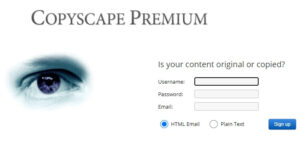Copyscape and DMCA
Copysentry by Copyscape

To protect the integrity of our intellectual property, we subscribe to the Copysentry service offered by Copyscape and Indigo Stream Technologies. Copysentry protects our site: Myla Bella against plagiarism and content theft by continuously monitoring the Web for copies of our content and e-mailing us as soon as they appear the same day.
Their follow-up helps us to manage multiple cases of plagiarism. Copysentry’s advanced technology and features make it the most comprehensive plagiarism protection service on the market, and intellectual property thieves can be easily intercepted.
Indigo Stream Technologies offers us continuous protection for all our content. It scans the entire Web for copies of our pages. Its powerful technology can track down stolen content and lead us to the source in less than 24 hours. We’ve worked very hard on the Myla Bellla website and developed pages with unique and original content. Don’t get into trouble and don’t copy or publish our pages.
Digital Millennium Copyright Act
A law passed in 1998, the Digital Millennium Copyright Act(DMCA), specifies that material published on the Internet is protected by copyright laws. The law provides for a few exceptions specific to Internet law. Internet service providers (ISPs) can escape liability for copyright infringement of material that merely passes through their servers, for example in e-mail messages. If an ISP promptly removes infringing material on request, it can also escape liability.
What is DMCA protection?

The DMCA, Digital Millennium Copyright Act, protects creative works on the Internet and is the legal basis for rights management of digital works. It covers items such as articles, videos and photographs. The DMCA protects both copyright holders and Internet Service Providers (ISPs).
Copyright holders
The DMCA offers copyright owners a simple, straightforward means of having their content removed from websites that do not have permission to use it. To do this, they can send a DMCA takedown notice to the ISP hosting the offending content. The law requires ISPs to comply with the notice, provided it meets certain standards.
DMCA notifications mean that the copyright owner does not have to deal directly with the person who stole the content. In addition, a DMCA notification can reduce the risk of legal action. Anyone accused of copyright infringement has the right to file a counter-notification, stating that no infringement has occurred.






